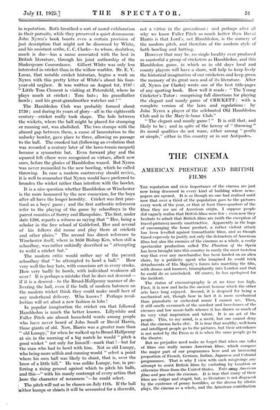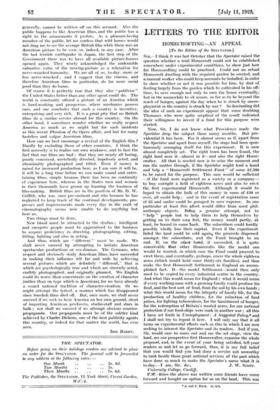THE CINEMA
AMERICAN PRESTIGE AND BRITISH FILMS
Tim reputation and civic importance of the cinema are just now being discussed in every kind of building where news- papers are opened. It is as though no one had realised until now that over a third of the population goes to the pictures every week of the year, or that at least three-quarters of the films they see arc of American origin. I suppose people did vaguely realise that British films were few ; even now they hesitate to admit that British films are (with the exception of travel-pictures) mostly unattractive. Apparently in the hope of encouraging the home product, a rather violent attack has been levelled against transatlantic films, and as though timed expressly to justify not only the detractors of American films but also the enemies of the cinemas as a whole, a costly spectacular production called The Phantom of the Opera has been brought into this country in surely the most tasteless way that ever any merchandise has been landed on an alien shore, by a publicity agent who imagined he could trick detachments of His Majesty's forces into marching the film, with drums and banners, triumphantly into London and that he could do so unrebuked. Of course, he has apologised for the incident.
The status of cinematography is at no time too high. First, it is new and lacks the ancient honour which the other arts have long enjoyed. Second, it is despised for being a mechanical art, though how in fact it is more mechanical than pianoforte or orchestral music I cannot see. Then, it still smells overmuch of the sawdust and beer-fumes of the circuses and low music-halls whence it has drawn so much of its very vital inspiration and talent. It is an art of the people. This, to my mind, is a merit, but one cannot deny that the cinema lacks chic. It is true that wealthy, well-born and intelligent people go to the pictures, but their attendance is not noted by the Press as it is when the same people go to the theatre.
But no prejudice need make us forget that when one talks of films one really means American films, which compose the major part of our programmes here and an increasing proportion of French, German, Indian, Japanese and Colonial programmes. That is why I view with such misgivings any attempt to assist British films by excluding by taxation or otherwise those from the United States. Take mazy American films and you close the cinemas. It is true that many of their films are vulgar and stupid, but, as literature is not disgraced by the existence of penny horribles, or the drama by idiotic plaj-s, the- cinema as a whole, and the American contribution
generally, cannot be written off on this account. Also the public happens to like American films, and the public has a right to the amusements it prefers. As a pleasure-loving member of the public, let me confess that wild horses would not drag me to see the average British film while there was an American picture to be seen, or, indeed, in any case. After the last terrible earthquake in Japan, the first step of the Government there was to have all available picture-houses opened again. They wisely acknowledged the undeniable calmative value of the moving-picture as a relaxation for nerve-wracked humanity. We are all of us, to-day, more or less nerve-wracked ; and I suggest that the cinema, and therefore American films in particular, do far more social good than they do harm.
Of course it is perfectly true that they also " publicize" the United States better than any other agent could do. The world is constantly offered a picture of an America which is hard-working and prosperous, where mechanics possess ears, and one concludes that such a country is inventive, enterprising and very rich. It is a great pity that no British films do a similar service abroad for this country. On the other hand, I sometimes wonder whether we really respect America as much as we might but for such incidents as this recent Phantom of the Opera affair, and but for many tasteless and vulgar American films.
How can we best encourage a revival of the English film ? Hardly by excluding those of other countries. I think the first necessity is to realize our own weakness, and to face the fact that our films are bad ; that they are nearly all boring, poorly conceived, wretchedly directed, hopelessly acted, and abominably photographed and titled. Even if money is raised for increased production here, as I am sure it will be, it will be a long time before we can make sound and enter- taining films, simply because there has been no continuity of experience here, whereas in the States men and women in their thousands have grown up learning the business of film-making. British films are in the position of Mr. D. W. Griffith, who was once pre-eminent and who because he has neglected to keep track of the continual developments, pro- gresses and improvements made every clay in the craft of cinematography seems now unable to do anything but bore us.
Two things must be done.
New blood must be attracted to the studios ; intelligent and energetic people must be apprenticed to the business to acquire proficiency in directing, photographing, editing, titling, lighting and also in acting.
And films which are " different " must be made. We shall never succeed by attempting to imitate American spectacular productions or sex-dramas. The Germans, who respect and obviously study American films, have succeeded in making their influence felt far and wide by achieving several pictures which are definitely " different," that is which are psychologically true and which are sincerely acted, craftily photographed, and originally planned. We English could do worse than concentrate on the creation of character (rather than on type which is American), for we have already a sound national tradition of character-creation. Or we might attempt the lyrical, a manner which has disappeared since Swedish films died off. But, once more, we shall never _succeed if we seek to beat America on her own ground, short of importing American producers, studio-staff and stars in bulk ; nor shall we succeed if we attempt obvious counter- propaganda. Our propaganda must be of the subtler kind achieved by Charles Dickens, one of the-best publicity agents this country, or indeed for that matter the world, has ever seen.
IRIS BARRY.



























































 Previous page
Previous page